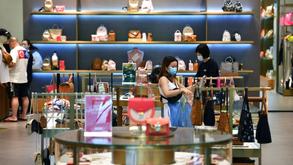 Tourists shop at a duty-free shopping mall in Sanya, South China's Hainan province, on March 12, 2020. (PHOTO / XINHUA)
Tourists shop at a duty-free shopping mall in Sanya, South China's Hainan province, on March 12, 2020. (PHOTO / XINHUA)
Continuous inflow of foreign capital; domestic tourists enjoying shopping sprees at duty-free centers; companies purchasing equipment from overseas at "zero tariffs" for production purposes. These developments and many others illustrate that the Hainan Free Trade Port is playing a crucial role in opening-up and facilitating the country's dual-circulation economy, experts said.
On April 13, 2018, the 30th anniversary of Hainan becoming a province, the central government decided to turn the island into China's 12th free trade zone.
On June 1, a master plan was released to build the tropical isle into a globally influential free trade port by the middle of the century.
More than 50 preferential policies-such as zero tariffs, low personal income and corporate taxes, and larger duty free shopping quotas-have helped the emerging free trade port become a new high point of opening-up and an important hub and intersection for domestic and international trade.
Given its advantages in terms of location, connectivity and opening-up policies, Hainan is in a prime position to become a meeting point of the domestic and global economies, said Shen Xiaoming, secretary of the Communist Party of China's Hainan Provincial Committee and head of the island's delegation to the ongoing fourth session of the 13th National People's Congress.
More than 50 preferential policies-such as zero tariffs, low personal income and corporate taxes, and larger duty free shopping quotas-have helped the emerging free trade port become a new high point of opening-up and an important hub and intersection for domestic and international trade
Meanwhile, an official with Electricite de France in Paris, said, "We are optimistic about the development opportunities in such sectors as advanced technologies and low-carbon economy in the Hainan FTP."
ALSO READ: Duty-free shopping flourishes in Hainan
The French utility company is cooperating with its Hainan partners to build clean energy and new energy vehicle infrastructure.
EDF was one of 1,005 foreign-invested enterprises established in Hainan last year, a rise of 197.3 percent from 2019, according to the Hainan commercial authority.
It said major investors, including Tesla, EDF, KWS and General Electric, came from 89 countries and regions, while the new investment projects cover the fields of aviation, tourism, medical services, culture and sports, banking, finance technology, clean energy, education and agriculture.
Zhou Wei, China regional general manager with German crop breeder KWS, said Hainan is a paradise for seed breeding and he believes there will be more policy dividends from the FTP to ensure the company will invest freely, especially in the development of a global transfer base for the introduction of animal and plant germplasm resources, designed by the FTP master plan.
Starting or expanding businesses in the FTP is becoming a favorite choice for more foreign companies, especially producers of established brand luxuries.
Officials with the commercial authority said more than 400 luxury brand companies will showcase their products at the first China (Hainan) International Consumer Products Expo from May 5 to 10.
The annual expo will be an important event to help boost Hainan's growth as an international tourism consumption center.
Hainan's duty-free shops have enjoyed booming business since July 1, when the central authorities raised the annual duty-free shopping quota to 100,000 yuan (US$15,000) per person from 30,000 yuan and allowed provision of a wider range of overseas goods.
Sales at the nine duty-free shops reached 1.5 billion yuan during the seven-day Spring Festival shopping spree-double that of the holiday in 2019-according to provincial government data.
READ MORE: Hainan FTZ part of new opening-up paradigm
Xia Feng, executive director of the Institute for Advanced Studies of Humanities and Social Sciences at Hainan University, said: "The new version of the policy on offshore duty-free items has prompted the return of Chinese tourists from overseas and contributed to 'internal circulation'. At the same time, the goods are mainly foreign brands, which also promotes 'international circulation'."


